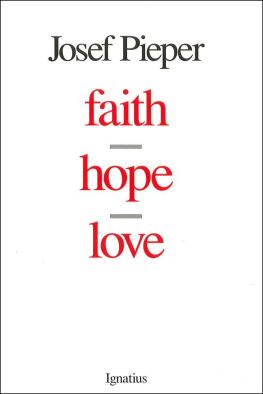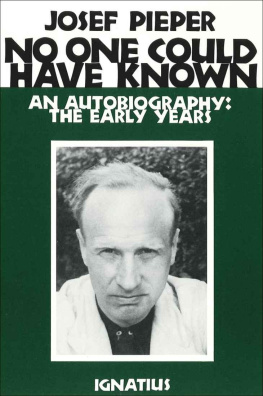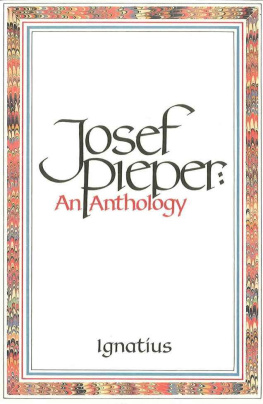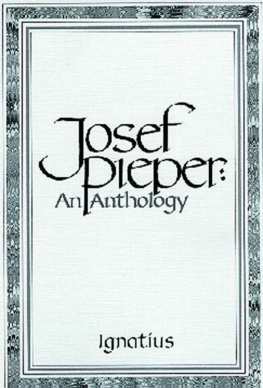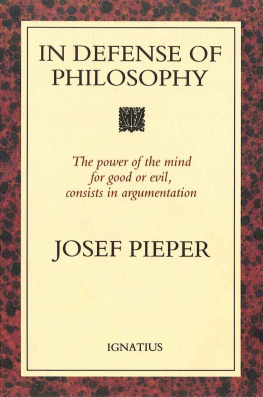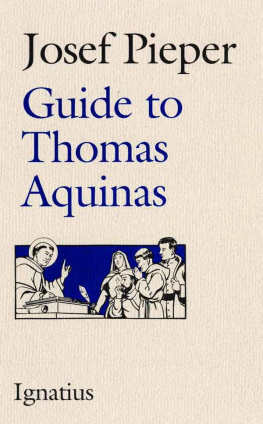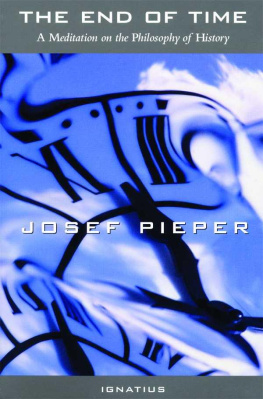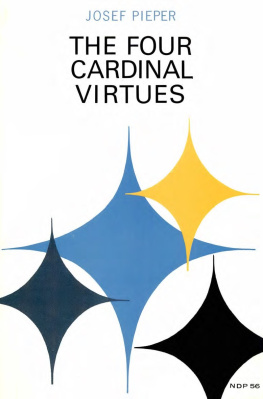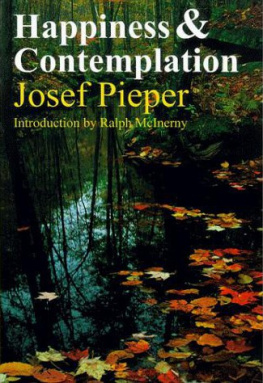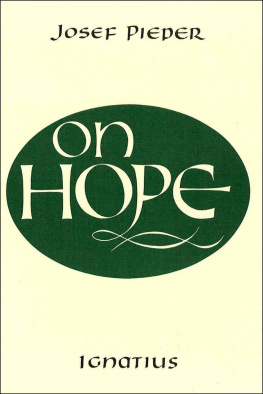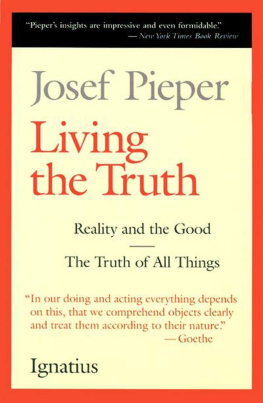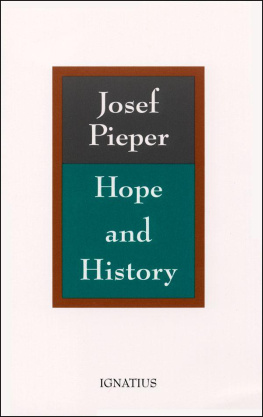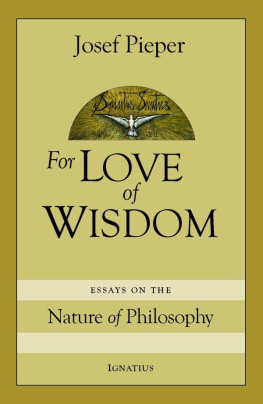Josef Pieper - Faith, Hope, Love
Here you can read online Josef Pieper - Faith, Hope, Love full text of the book (entire story) in english for free. Download pdf and epub, get meaning, cover and reviews about this ebook. year: 0, genre: Religion. Description of the work, (preface) as well as reviews are available. Best literature library LitArk.com created for fans of good reading and offers a wide selection of genres:
Romance novel
Science fiction
Adventure
Detective
Science
History
Home and family
Prose
Art
Politics
Computer
Non-fiction
Religion
Business
Children
Humor
Choose a favorite category and find really read worthwhile books. Enjoy immersion in the world of imagination, feel the emotions of the characters or learn something new for yourself, make an fascinating discovery.
- Book:Faith, Hope, Love
- Author:
- Genre:
- Year:0
- Rating:5 / 5
- Favourites:Add to favourites
- Your mark:
- 100
- 1
- 2
- 3
- 4
- 5
Faith, Hope, Love: summary, description and annotation
We offer to read an annotation, description, summary or preface (depends on what the author of the book "Faith, Hope, Love" wrote himself). If you haven't found the necessary information about the book — write in the comments, we will try to find it.
Faith, Hope, Love — read online for free the complete book (whole text) full work
Below is the text of the book, divided by pages. System saving the place of the last page read, allows you to conveniently read the book "Faith, Hope, Love" online for free, without having to search again every time where you left off. Put a bookmark, and you can go to the page where you finished reading at any time.
Font size:
Interval:
Bookmark:
FAITH, HOPE, LOVE
JOSEF PIEPER
IGNATIUS PRESS SAN FRANCISCO
Title of the German original:
Lieben, Hoffen, Glauben
1986 Ksel-Verlag GmbH & Co., Munich
ber den Glauben
1962 Ksel-Verlag GmbH & Co., Munich
English edition: Belief and Faith: A Philosophical Tract
Translated by Richard and Clara Winston
1963 Random House, Inc., New York
Copyright renewed, 1991 by Random House, Inc.
This translation published by arrangement with
Pantheon Books, a division of Random House, Inc.
ber die Hoffnung , 7th edition
1977 Ksel-Verlag GmbH & Co., Munich
English edition: On Hope
Translated by Sister Mary Frances McCarthy, S.N.D.
1986 Ignatius Press, San Francisco
ber die Liebe , 7th edition
1992 Ksel-Verlag GmbH & Co., Munich
English edition: About Love
Translated by Richard and Clara Winston
1974 Franciscan Herald Press, Chicago
Reprinted with permission
All rights reserved
Printed in 1997, Ignatius Press, San Francisco
ISBN 978-0-89870-623-9
Library of Congress catalogue number 96-78013
Printed in the United States of America
In memory of
Hildegard Pieper
+ June 25, 1984
On Faith
A Philosophical Treatise
The earliest and the most recent of the works brought together here for the first time in one volume are separated by a temporal distance of thirty-seven years. And naturally there are also considerable differences in linguistic and intellectual character between the book on hope, published in 1935, and that on love, which appeared in 1972. These stem from the inner and external biography of the author. Some brief, prefatory remarks are therefore necessary.
When my manuscript On the Meaning of Couragewritten down in anger at the beginning of 1934, in anger about the fact that no express counterpart had appeared to the words heroic service, which were booming at that time, in the second year of the national socialist regime, from all the loudspeakerswhen this work, declined by four or five of the publishing houses I was acquainted with, repeatedly came back to me like a boomerang, I sent it without a moments hesitation, with the courage of despair, to Jakob Hegner in Leipzig, who, as the publisher of Claudel, Guardini and Bernanos, appeared to me to be entirely inaccessible. But to my surprise, in just a few days, the astonishing answer came that the book was accepted and would be printed that same year, which then actually happened. Far more astonishing still, however, was Jakob Hegners additional and by no means rhetorically expressed question whether there were not seven such basic virtues.
He in any case was ready to publish two such works by me every yearactually, an author interested him much more than a single book. The vista suddenly opening up here seemed to me like an absolutely unforeseeable stroke of luck; and it was so indeed. In the summer of that event-laden year 1934, with the wonderful letter from, my publisher in my pocket, it did not take me long to consider which should be the second virtue in the newly begun series: it could, of course, only be hope! The unconcerned lack of hesitation with which I instantly set to work corresponded, as I quickly began to feel, more to the state of mind current in the thirties than to my level of knowledge or powers of representation or intellect. After all, as an unemployed intellectualfortunately, or rather unfortunately, completely free of any professional demandsI had a whole autumn and winter long, with much effort and as a labor of love, but above all in undiverted surrender to the subject, to succeed in finishing the opusculum On Hope. And right on schedule came the slender Hegner volume, in the typography and layout for which the publisher was justly renowned.
How much I, basically unsuspecting, had fallen into a simply inexhaustible theme, which I had been capable of sketching only in outline at best, became clear enough to me quite soon. In the new edition presented here, I have nevertheless changed the original text only a little. But I would not like to omit mention of particular later works, in which, prompted by Gabriel Marcel and challenged by Ernst Bloch, I have tried to supplement the first sketch considerably: namely, the Paris lecture on the hope of the martyrs (which Teilhard de Chardin vehemently attacked as defeatist
After the publication of my book on justice (1953), I had only the two most difficult of the seven treatises on the basic virtues left to write, the one on faith, the other on love. Meanwhile, by means of my habituation , I had an opportunity at the university that had not been open to me until then: that of preparing what amounted nearly to a book in the form of lectures, therefore as an oral presentation, and to test it before a critical audience.
So I announced a semester course of lectures for the winter of 1955-56: Faith as Philosophical Problem (Thomas Aquinas, J. H. Newman, K. Jaspers). These were by all means to be philosophical, not theological, reflectionsalthough I naturally remain convinced that philosophy and theology are to be differentiated, to be sure, but not dissociated. The writing by Karl Jaspers on philosophical faith always represents for me the adversarial view; I find its inner inconsistency both incomprehensible and characteristic of a certain type of modern thinking. After a second, entirely new lecture, recorded word for word, from the summer of 1961 (FaithConsidered Philosophically), the text of the book on faith was finally translated into the form of a written address and appeared as a book in 1962, with what was for me an important subtitle: A Philosophical Treatise.
I more than once gave up in the face of the task of writing about the theme of love, which I had, at any rate, put off to the end; and after a few years of futile attempts, I had finally resigned myself never to accomplishing an adequate presentation. Since it is told in detail in my autobiographical writings, I need not relate once again in what unforeseen ways the book On Love came about after all. Incidentally, it seems to me today to be my most important bookperhaps because it cost me more effort than any of the others.
Arnulf Baring, who evidently knew this history of my effort, once asked me in a radio interview precisely what the difficulty was. The answer was not easy to formulate. Already during my work on the book about faith I had to some extent felt restricted by the definition of the notion virtue; this was also the reason why I insisted on calling the work a philosophical treatise. Such a restriction, however, seemed to me quite impossible as regards the theme of love; in any event, I was absolutely against the concept. So I had the very clear, prodigious task of presenting what the German language, as distinct from many others, still calls by the single word love and of then discussing not only the theological virtue of caritas-agape but also eros, sexuality and even love of music and wine. In spite of all that, in the end, the difficultywhich almost forced me to abandon the projectthen lay not only in bringing all that is homogeneous in all forms of love to a handy formula but also in making the real basis for this identity perceptible.
I trust that these preliminary remarks make clear that the works submitted here do not lay claim to being theological treatises in the strict sense.
J. P.
He who wishes to learn
must believe
Aristotle
I
The true meaning of root words is not easy to determine, despite the fact that they have always been present in language. It is well to distrust the perfection of excessively precise definitions.The fundamental types of attitude: doubt, opinion, knowledge, belief.Two elements of the concept of belief: the content cannot be verified, and yet it is unreservedly accepted as true and real.When there proves to be no substitute for a word, we know we are using it in the strict sense.The complete concept in outline: Belief means to regard something as true on the testimony of someone else. 19
Next pageFont size:
Interval:
Bookmark:
Similar books «Faith, Hope, Love»
Look at similar books to Faith, Hope, Love. We have selected literature similar in name and meaning in the hope of providing readers with more options to find new, interesting, not yet read works.
Discussion, reviews of the book Faith, Hope, Love and just readers' own opinions. Leave your comments, write what you think about the work, its meaning or the main characters. Specify what exactly you liked and what you didn't like, and why you think so.

